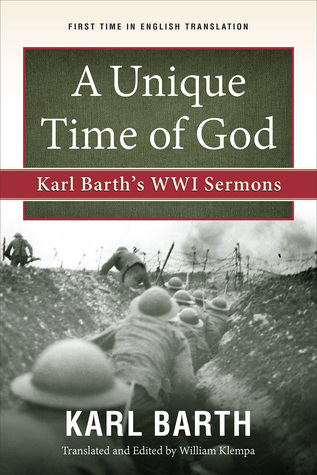- Bible
- Read the Bible
- Bible Versions
- Verse of the Day
- Reading Plans
- Verses by Topic
- Books of the Bible
- Bible Images
- Study
- Commentaries
- Concordances
- Dictionaries
- Encyclopedias
- Sermons
- Bible Atlas & Maps
- BP Wiki
- Devotionals
- Today's Devotionals
- Light of the World
- All Devotionals
- Inspirational Quotes
- More
- Picture Quotes
- Videos
- Inspirational
- Bible Study
- What The Bible Says
- Bible Q&As
- Daily Bread
- Bible by Genre
- Bible Stories
- Random Bible Verse
- Community
- Store
A Unique Time of God: Karl Barth's WWI Sermons
by Karl Barth
World War I changed Karl Barth’s theology forever. In this book William Klempa presents for the first time in English thirteen sermons that offer Barth’s unique view and commentary on the Great War. Barth saw the war as “a unique time of God,” believing it to represent God’s judgment on militarism. The sermons reveal a deep strain of theological wrestling with the war’s meaning, as Barth comes to see the conflict as the logical outcome of all human attempts to create God in our own image. As it demonstrates a decisive shift in Barth’s early theology, this volume is essential for anyone who wishes to understand the twentieth century’s greatest theologian.
BUY NOW
Paperback, 240 pages
Published December 30th 2016 by Westminster John Knox Press
© 2025 Bibleportal.com All rights reserved.

Karl Barth was a Swiss Reformed theologian whom critics hold to be among the most important Christian thinkers of the 20th century.
Beginning with his experience as a pastor, he rejected his training in the predominant liberal theology typical of 19th-century Protestantism. Instead he embarked on a new theological path initially called dialectical theology, due to its stress on the paradoxical nature of divine truth (e.g., God's relationship to humanity embodies both grace and judgment). Other critics have referred to Barth as the father of neo-orthodoxy -- a term emphatically rejected by Barth himself. The most accurate description of his work might be "a theology of the Word." Barth's theological thought emphasized the sovereignty of God, particularly through his innovative doctrine of election.
Barth tries to recover the Doctrine of the Trinity in theology from its putative loss in liberalism. His argument follows from the idea that God is the object of God's own self-knowledge, and revelation in the Bible means the self-unveiling to humanity of the God who cannot be discovered by humanity simply through its own efforts.
... Show more